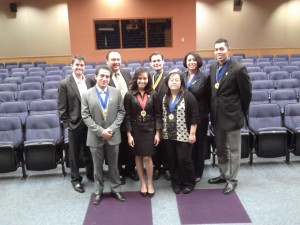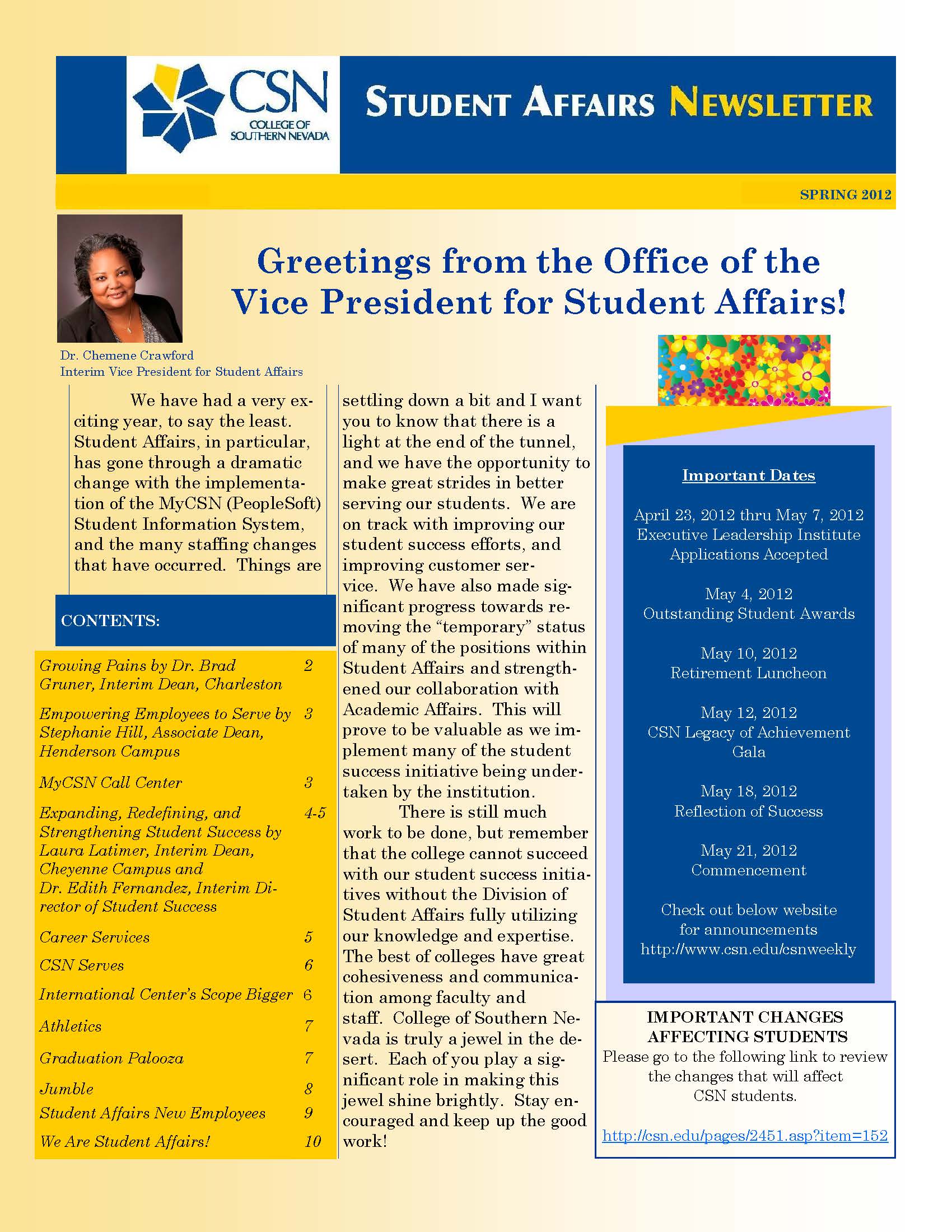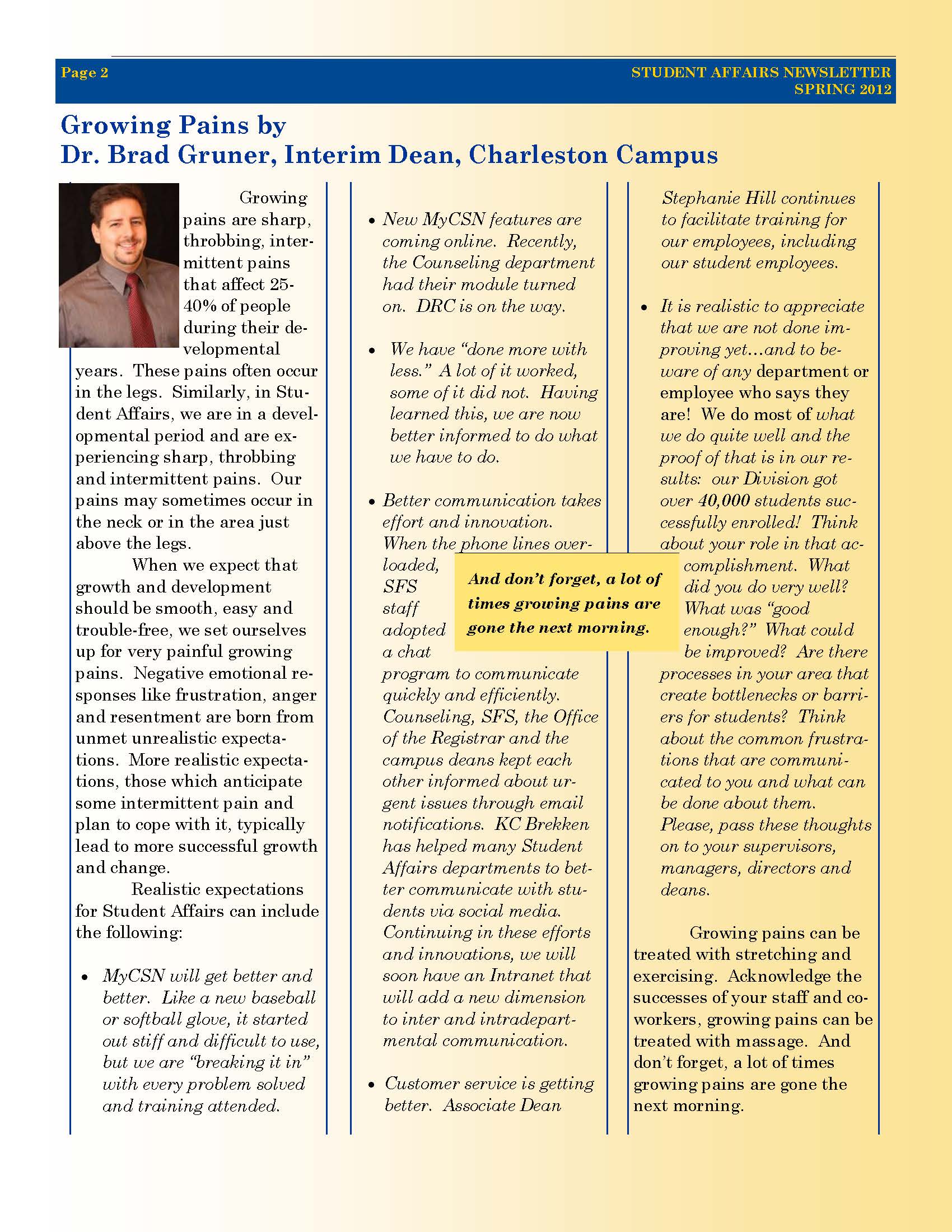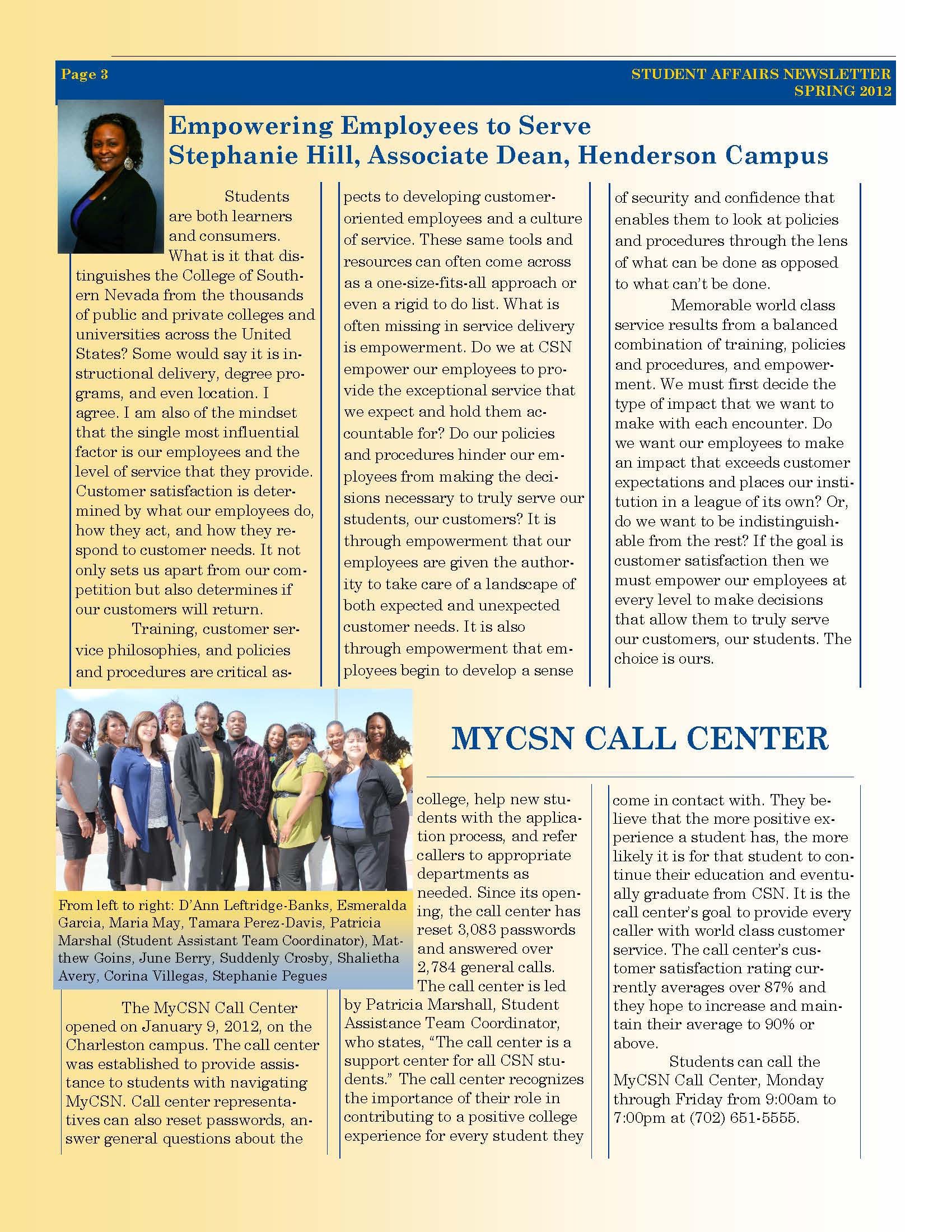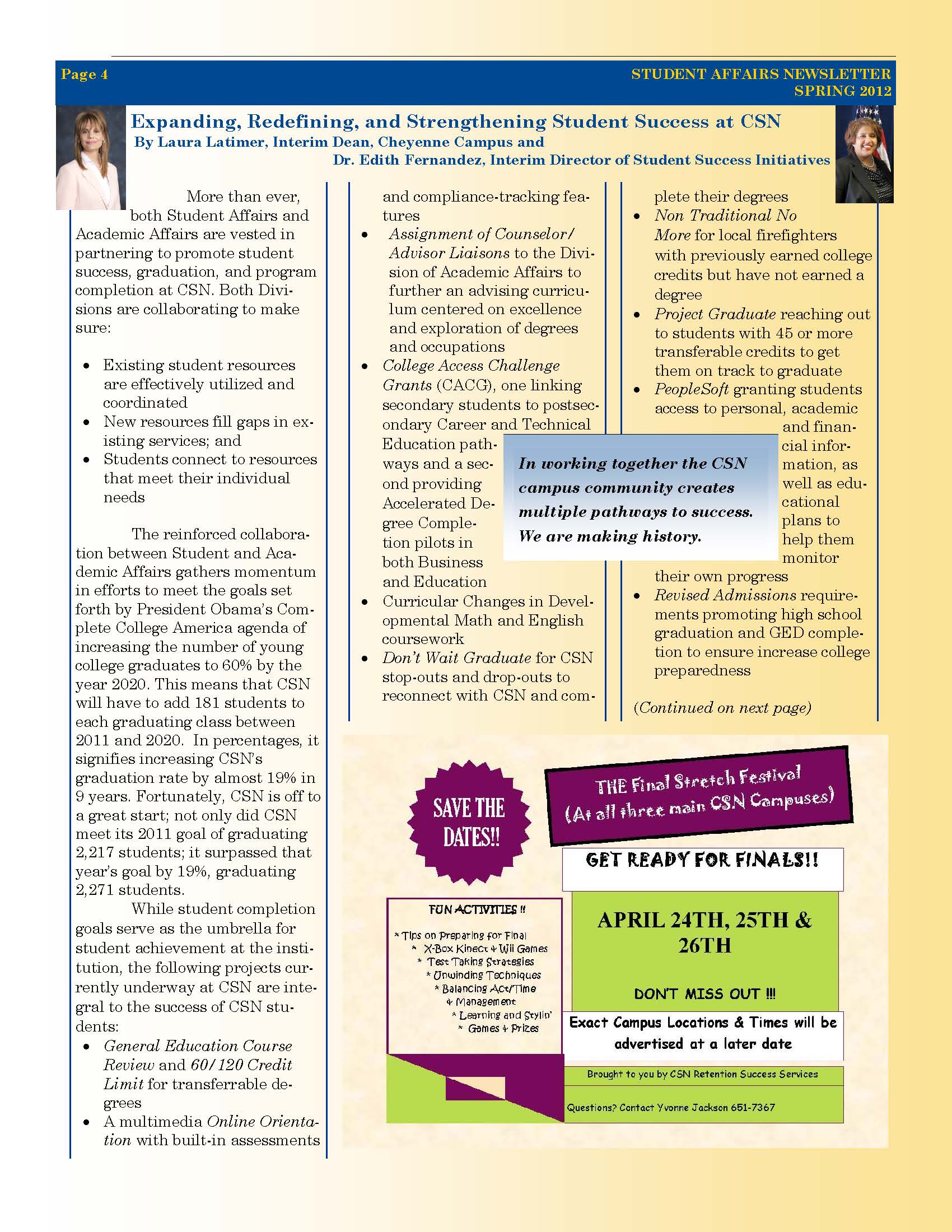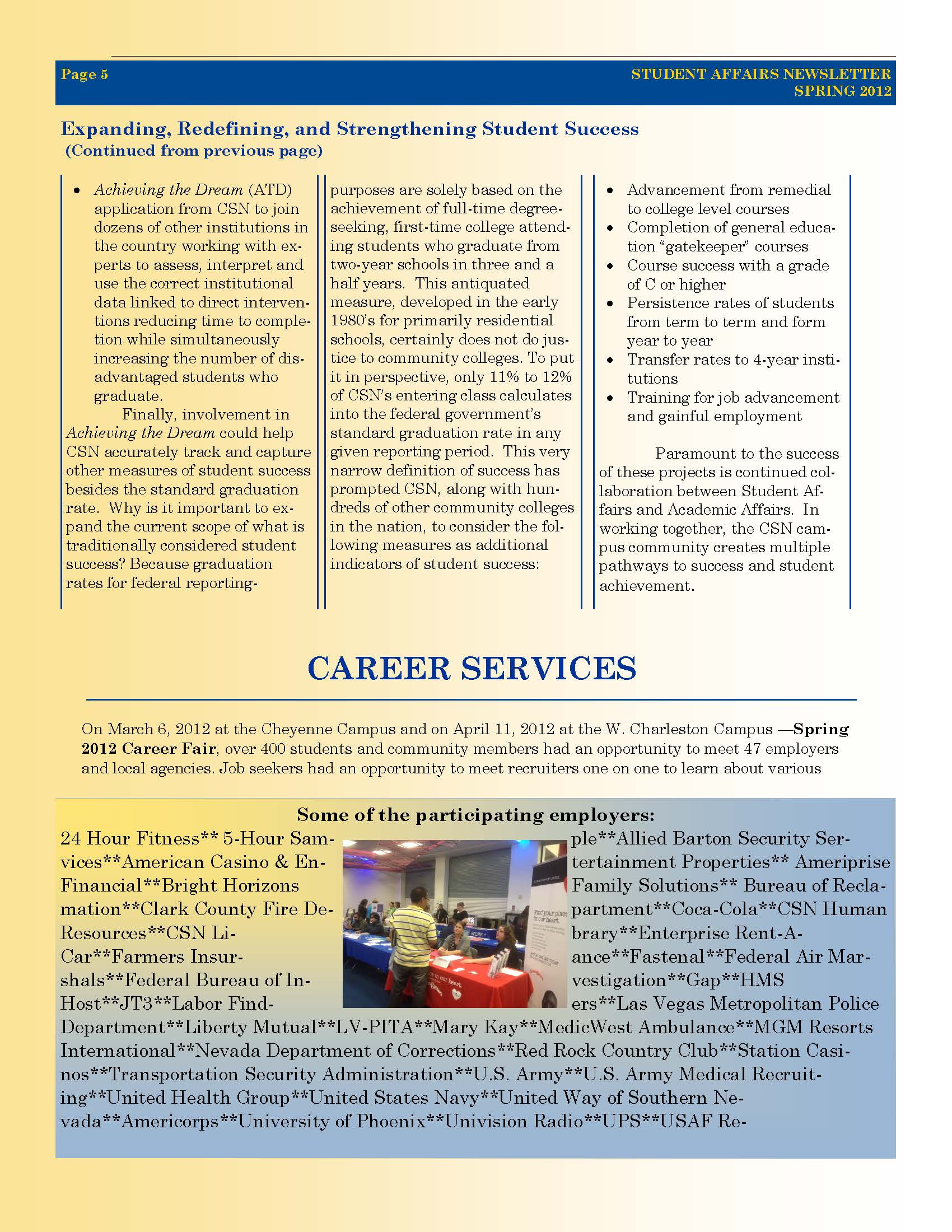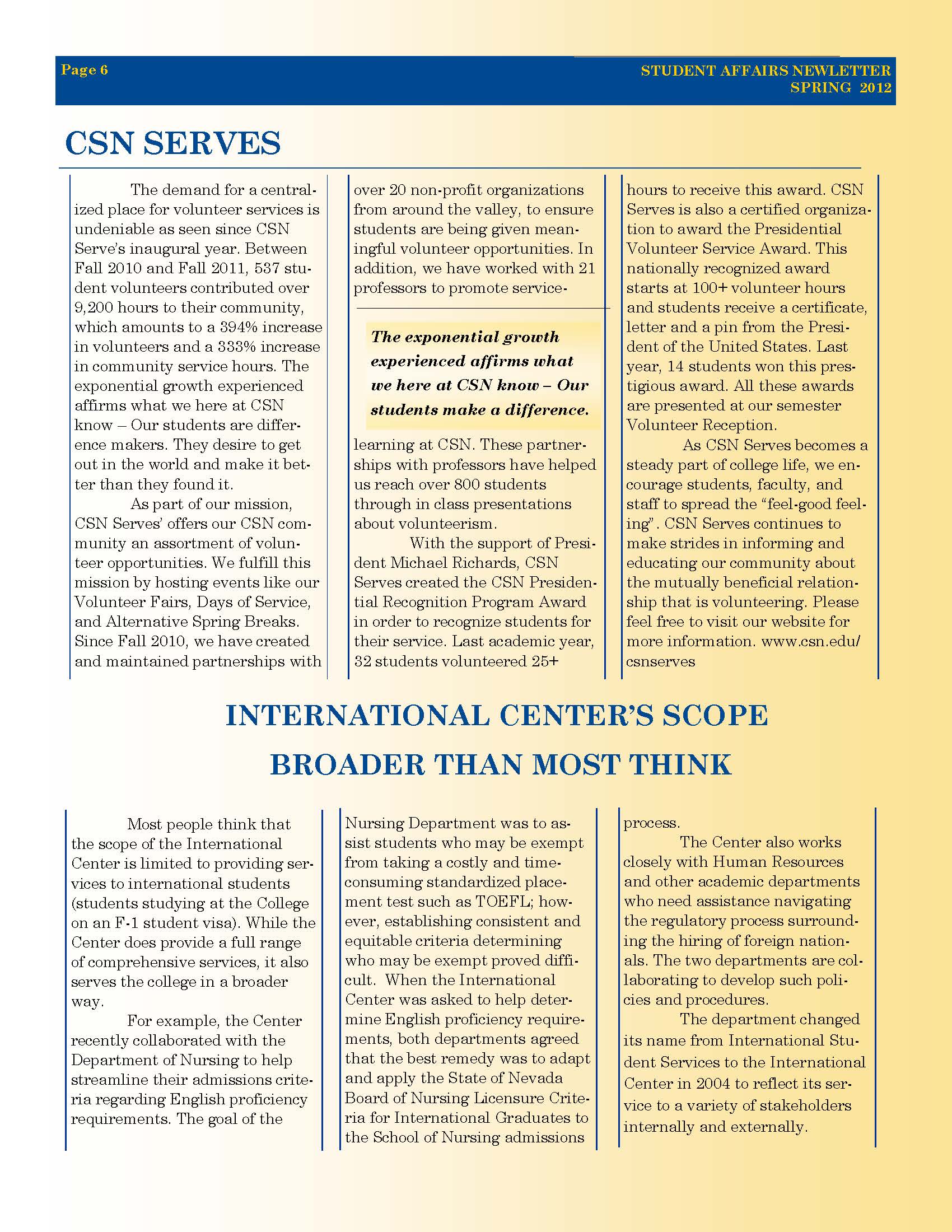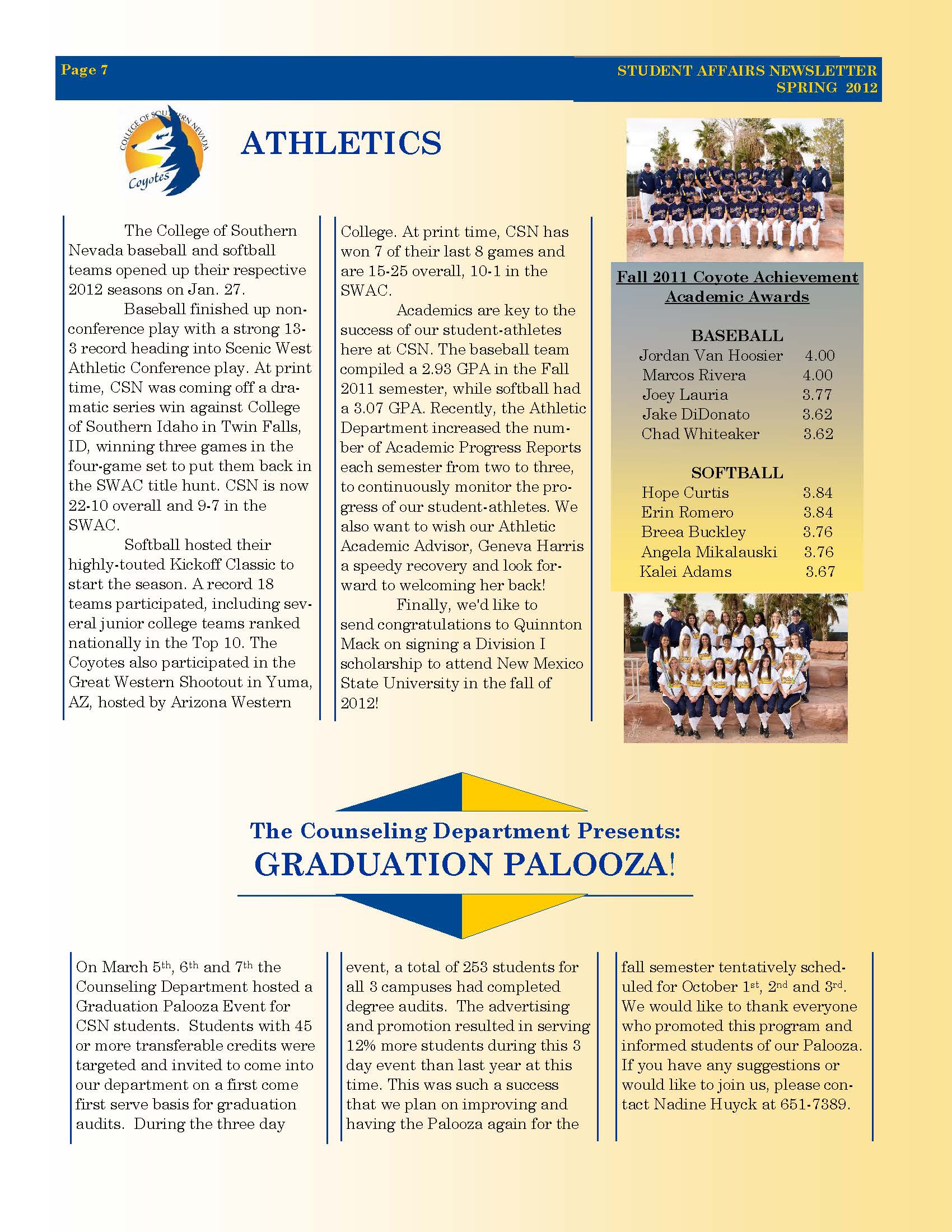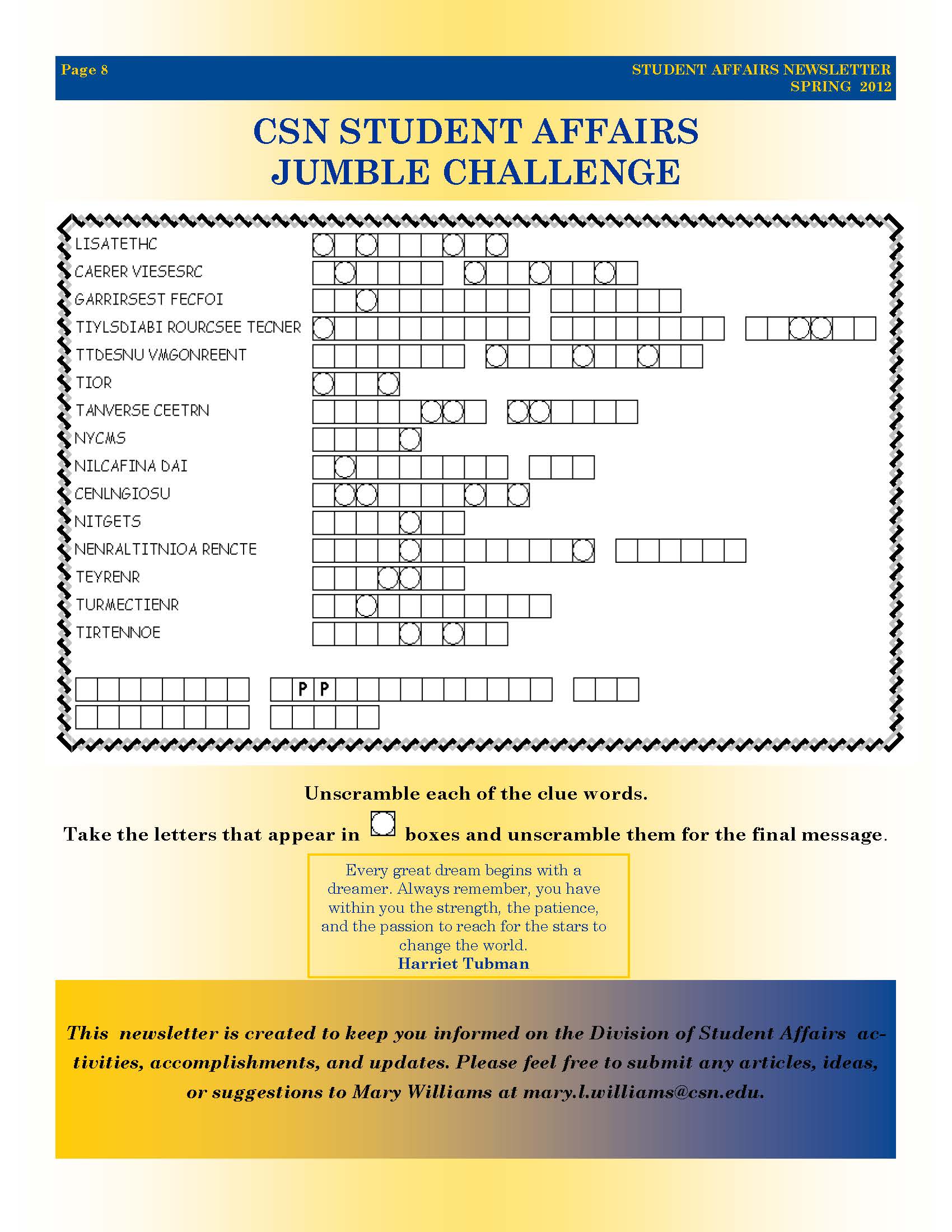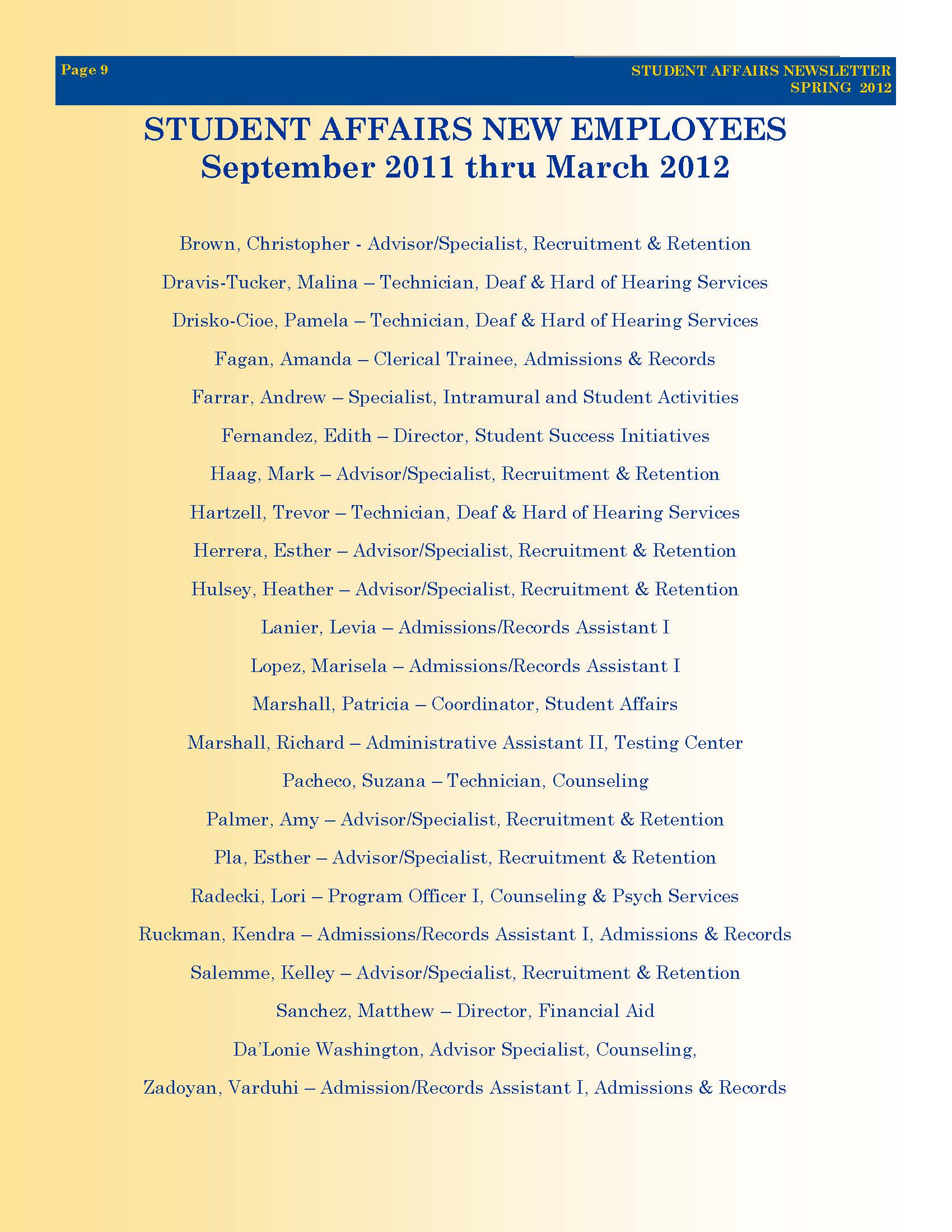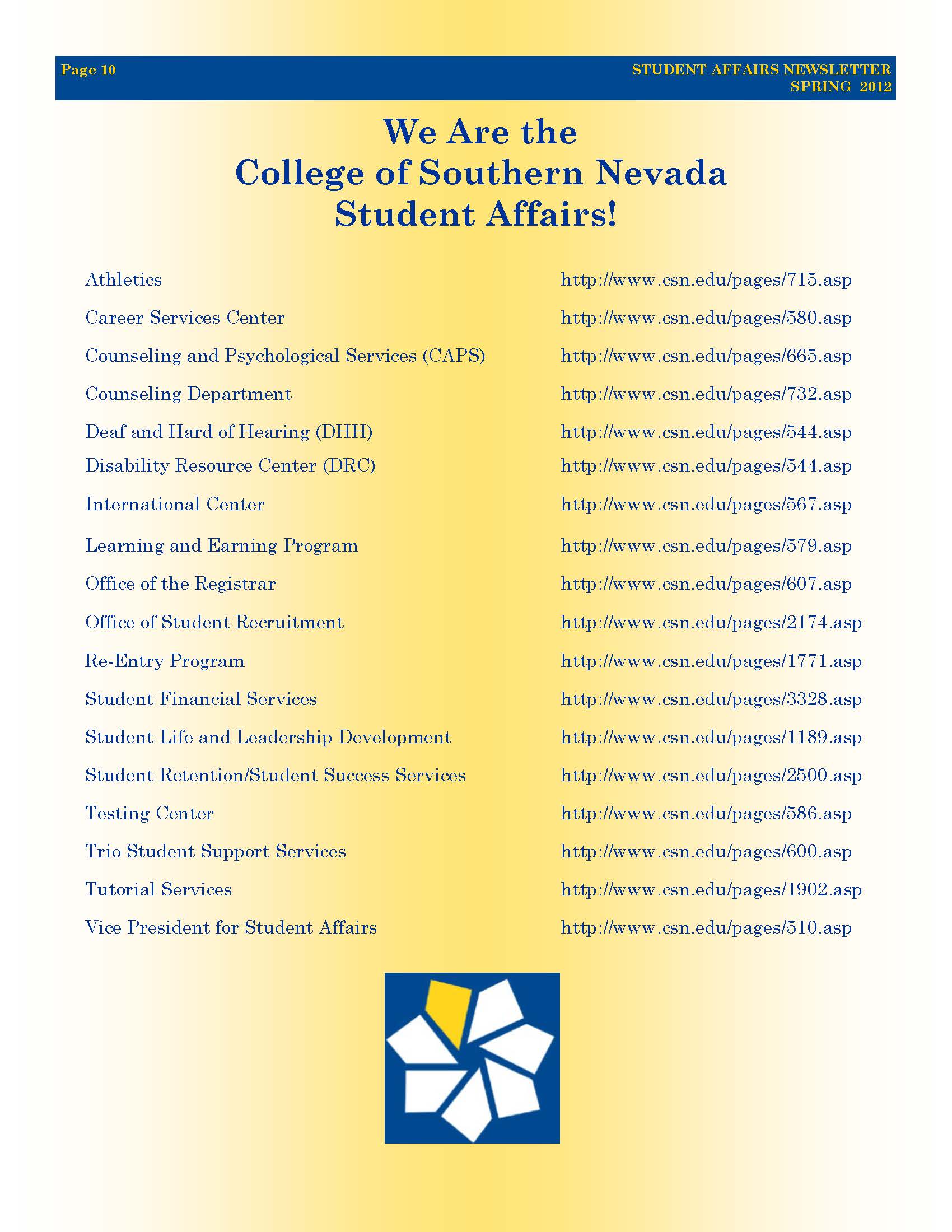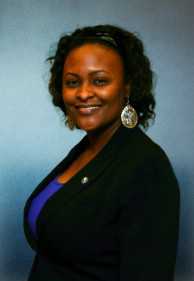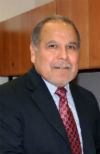 Student Affairs is changing with a renewed commitment to improving the student experience, providing engaging opportunities for student development, and for collaborating with Academic Affairs in developing an even more challenging and supportive learning environment. Student Affairs is reorganizing and one of the first steps forward is the promotion of the following individuals to Assistant Vice Presidents:
Student Affairs is changing with a renewed commitment to improving the student experience, providing engaging opportunities for student development, and for collaborating with Academic Affairs in developing an even more challenging and supportive learning environment. Student Affairs is reorganizing and one of the first steps forward is the promotion of the following individuals to Assistant Vice Presidents:
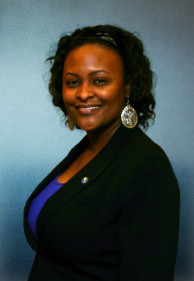 Stephanie Hill has assumed her role as Assistant Vice President for Student Engagement. Her duties include supervision of personnel, operations, resources, budgetary oversight, planning, programmatic implementation, and outcome evaluation over the following major areas: CSN Central, CSN Serves, Intramurals, CSN Call Center, Sports Center, Student Government, Student Life, and Commencement. Her responsibilities include: Leading collaborative efforts with academic and student affairs to provide appropriate service delivery and promote understanding of how personal and social development, institutional practices, and academic processes affect student success; Providing leadership to the development of initiatives for promoting the development of a student-centered environment which supports the personal, social, and academic development of all students; Providing leadership to the development of initiatives which support the development of a college success culture; Helps to educate the campus community on trends related to Student Affairs; and, Leads in the development of Customer Service Training. The AVP serves as the leader in the development, implementation, and evaluation of an infrastructure designed to engage students in the successful pursuit of higher education. In addition, she serves as Student Conduct Officer for all disciplinary and academic integrity cases adjudicated on the Henderson and Online campuses.
Stephanie Hill has assumed her role as Assistant Vice President for Student Engagement. Her duties include supervision of personnel, operations, resources, budgetary oversight, planning, programmatic implementation, and outcome evaluation over the following major areas: CSN Central, CSN Serves, Intramurals, CSN Call Center, Sports Center, Student Government, Student Life, and Commencement. Her responsibilities include: Leading collaborative efforts with academic and student affairs to provide appropriate service delivery and promote understanding of how personal and social development, institutional practices, and academic processes affect student success; Providing leadership to the development of initiatives for promoting the development of a student-centered environment which supports the personal, social, and academic development of all students; Providing leadership to the development of initiatives which support the development of a college success culture; Helps to educate the campus community on trends related to Student Affairs; and, Leads in the development of Customer Service Training. The AVP serves as the leader in the development, implementation, and evaluation of an infrastructure designed to engage students in the successful pursuit of higher education. In addition, she serves as Student Conduct Officer for all disciplinary and academic integrity cases adjudicated on the Henderson and Online campuses.
Ms. Hill began her service at CSN in 1999. She holds the Associate of Arts degree from CCSN (2000), the Masters in Public Administration degree from UNLV (2007), and is currently pursuing the Doctorate in Education (Organizational Leadership) from NOVA Southeastern University.
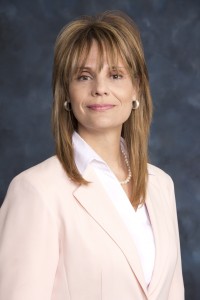 Laura Latimer has assumed her role as Assistant Vice President for Community Engagement. Her duties include supervision of personnel, operations, resources, budgetary oversight, strategic planning, programmatic implementation, and outcome evaluation over the following major areas: Admissions, Alumni Services, Gear Up, Student Recruitment, Retention, Orientation Services, Project Graduation, TRiO Student Support Services, Learn and Earn, CSN College Connection, CSN Ambassadors, Success Coaches, and Transfer Centers. Her responsibilities include: Leading collaborative efforts with academic and student affairs to provide appropriate service delivery and promote understanding of how personal and social development, institutional practices, and academic processes affect student success; Developing initiatives and strategies for promoting the development of a student-centered environment which supports the personal, social, and academic development of all students; Providing leadership to the development of community-based initiatives which support the development of a college-going/ college success community culture; and, serving as the leader in the development, implementation, and evaluation of an infrastructure designed to engage the internal and external communities in supporting students in their pursuit of higher education. In addition, she serves as Student Conduct Officer for all disciplinary and academic integrity cases adjudicated on the Cheyenne campus.
Laura Latimer has assumed her role as Assistant Vice President for Community Engagement. Her duties include supervision of personnel, operations, resources, budgetary oversight, strategic planning, programmatic implementation, and outcome evaluation over the following major areas: Admissions, Alumni Services, Gear Up, Student Recruitment, Retention, Orientation Services, Project Graduation, TRiO Student Support Services, Learn and Earn, CSN College Connection, CSN Ambassadors, Success Coaches, and Transfer Centers. Her responsibilities include: Leading collaborative efforts with academic and student affairs to provide appropriate service delivery and promote understanding of how personal and social development, institutional practices, and academic processes affect student success; Developing initiatives and strategies for promoting the development of a student-centered environment which supports the personal, social, and academic development of all students; Providing leadership to the development of community-based initiatives which support the development of a college-going/ college success community culture; and, serving as the leader in the development, implementation, and evaluation of an infrastructure designed to engage the internal and external communities in supporting students in their pursuit of higher education. In addition, she serves as Student Conduct Officer for all disciplinary and academic integrity cases adjudicated on the Cheyenne campus.
Ms. Latimer first came to CSN in 2001 from UNLV to assume the Director, Millennium Services. She holds the Bachelor of Arts degree in Anthropology from the University of Kentucky (1986) and the Masters of Arts in Education from the Virginia Polytechnic Institute and State University Blacksburg, Virginia (1989). She completed the Leadership Academy, Clark County & City of Las Vegas (2003) and the Advanced Leadership Academy, College Of Southern Nevada (2011).
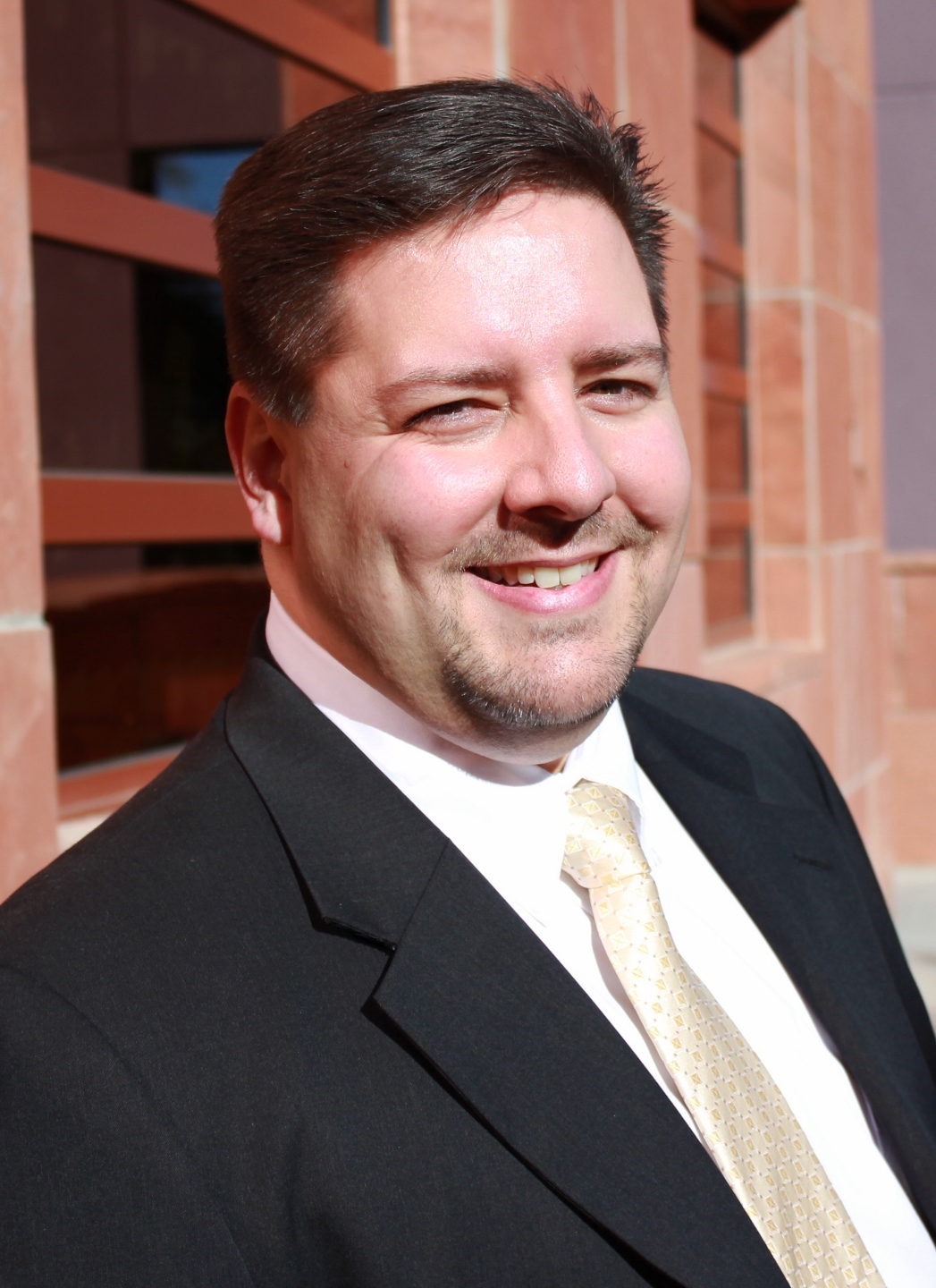 Dr. Bradley Gruner has assumed his role as Assistant Vice President for Student Services. His duties include supervision of personnel, operations, resources, budgetary oversight, strategic planning, programmatic implementation, and outcome evaluation over the following major areas: Counseling and Psychological Services, Career & Re-Entry, the Disability Resource Center, the International Center, Ombudsman, and Testing. He is responsible for: Providing leadership and supervision to services designed to support students in the learning environment, the pursuit of higher education, and hence enhance student success. His duties include: Leading collaborative efforts with academic and student affairs to provide appropriate service delivery of student support services; Promoting the understanding of how personal and social development, institutional practices, and academic processes affect student success; and, Developing initiatives and strategies for promoting the development of a student-centered environment which supports the personal, social, and academic development of all students. In this role, he will develop staffing recommendations, division specific policies, and determine type of professional development needed for the emerging structure to be effective. Additional responsibility includes service as Student Conduct Officer for all disciplinary and academic integrity cases adjudicated on the Charleston campus.
Dr. Bradley Gruner has assumed his role as Assistant Vice President for Student Services. His duties include supervision of personnel, operations, resources, budgetary oversight, strategic planning, programmatic implementation, and outcome evaluation over the following major areas: Counseling and Psychological Services, Career & Re-Entry, the Disability Resource Center, the International Center, Ombudsman, and Testing. He is responsible for: Providing leadership and supervision to services designed to support students in the learning environment, the pursuit of higher education, and hence enhance student success. His duties include: Leading collaborative efforts with academic and student affairs to provide appropriate service delivery of student support services; Promoting the understanding of how personal and social development, institutional practices, and academic processes affect student success; and, Developing initiatives and strategies for promoting the development of a student-centered environment which supports the personal, social, and academic development of all students. In this role, he will develop staffing recommendations, division specific policies, and determine type of professional development needed for the emerging structure to be effective. Additional responsibility includes service as Student Conduct Officer for all disciplinary and academic integrity cases adjudicated on the Charleston campus.
Dr. Gruner began his experience with CSN in 2005 as a Clinical Psychologist with Counseling and Psychological Service. He is a Licensed Clinical Psychologist in the State of Nevada, holds the Bachelor of Arts degree in Psychology from Marist College (1991), the Master of Arts degree from Marist College in Counseling / Community Psychology (1992) and the Doctorate in Clinical Psychology from the University of Denver (2001). Dr. Gruner completed a Post-Doctoral Fellowship in Pediatric Neuropsychology at the Neurodevelopmental Center, North Shore Medical Center/North Shore Children’s Hospital in MA (2001-2002).
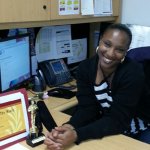 “I love how June is always so very helpful anytime she is needed. She is kind and does not make me feel like any question is small. Thank you June for your help and kindness to us all.”
“I love how June is always so very helpful anytime she is needed. She is kind and does not make me feel like any question is small. Thank you June for your help and kindness to us all.”